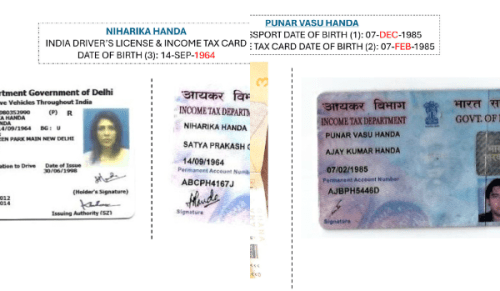An Indian national Niharika Handa, who secured Ghanaian citizenship, faces scrutiny in the discrepancies in her dates of birth in three different documents.
The inconsistencies in her documents extend beyond Ghana.
The unfolding saga has drawn renewed attention to how Ms. Handa and her son, Punar Vasu Handa, obtained Ghanaian passports and naturalisation rights after allegedly living in Ghana for fewer years than the law requires.
More troubling, however, are the conflicting records of her date of birth—discrepancies so stark that it is questionable to explain them away as mere “clerical errors,” as her lawyers stated.
A tale of three birth dates
The controversy first erupted when it emerged that Ms. Handa’s Ghanaian passport records her date of birth as September 14, 1965, while her Indian passport lists it as September 14, 1961—a four-year difference.
When media reports questioned how this discrepancy was allowed to slip through Ghana’s immigration processes, her lawyer, prominent legal practitioner Thaddeus Sory, issued a statement. He said the inconsistency was “obviously a clerical error.”

This explanation raised more questions as on July 8, 2022, Ms. Handa obtained a GhanaCard bearing the disputed year 1965.
Just twelve days later, on July 20, 2022, she was issued a Ghanaian passport carrying the exact same year of birth.
These timelines cast doubt on the clerical error justification by her lawyer.
Instead, it suggests that two competent Ghanaian state institutions—the National Identification Authority and the Passport Office—captured the same “error” without Ms. Handa making any effort to rectify it.
Using the “error” to build a new identity
Despite maintaining that her passport’s date of birth was an error, Ms. Handa has made extensive use of it.
She has travelled internationally to the United Kingdom, Schengen countries, Dubai, and Morocco, all on the Ghanaian passport reflecting 1965 as her year of birth.
She has also established new businesses in Ghana, the UK, Austria, and other jurisdictions; all using the same disputed records.
At Ghana’s Registrar-General’s Department, she amended corporate filings for Gold Crest Refinery, replacing her earlier birth year of 1961—as found on her Indian passport—with 1965, aligning it with her Ghanaian identity documents.
This raises the question: if indeed this was a clerical mistake, why did Ms. Handa continue to rely on it in official and commercial dealings across multiple countries?
New revelations from India
Records from India also indicate that Ms. Handa’s Indian Permanent Account Number (PAN) card and driver’s licence both list her birth year as 1964.

This revelation means that she now has three conflicting birth years across official documents comprising 1961 – on her Indian passport, 1964 – on her Indian PAN card and driver’s licence and 1965 – on her Ghanaian passport and GhanaCard.
A troubling background
Even as Ms. Handa was pursuing naturalisation in Ghana, she faced serious legal troubles in India.
Court records show she was facing criminal proceedings and was the subject of 14 non-bailable arrest warrants which his lawyers said she successfully challenged and was exonerated.

Son also under suspicion
The trail of inconsistencies does not end with Ms. Handa.
Her son, Punar Vasu Handa, appears to be a subject of similar identity discrepancies.
His Ghanaian passport lists his date of birth as December 7, 1985, while his Indian PAN Card records it as February 7, 1985.
Implications for Ghana
The Handa case exposes glaring weaknesses in Ghana’s immigration and naturalisation systems.














